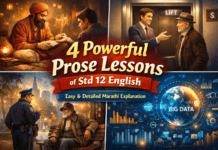25 Common Phrases
Introduction:
Language is a rich tapestry woven with phrases that bring depth and expression to our conversations. These phrases often carry unique meanings and connotations that go beyond their literal interpretations. In this blog post, we’ll explore 25 common phrases, delve into their meanings, and provide examples of how to use these phrases in sentences.
Phrases , meaning and Sentences
Study these phrases , memorise the meaning, observe the uses and use these common phrases in your own sentences.
- “Break a leg”:
- Meaning: Wishing someone good luck or success, especially before a performance or important event.
- Sentence: “Before her audition, I told her to break a leg for good luck.”
- “Piece of cake”:
- Meaning: Describing a task or situation that is extremely easy.
- Sentence: “Completing the puzzle was a piece of cake; it only took me a few minutes.”
- “Bite the bullet”:
- Meaning: Facing a difficult or unpleasant situation with courage and determination.
- Sentence: “She had to bite the bullet and admit her mistake to the team.”
- “Burning the midnight oil”:
- Meaning: Working late into the night or early morning hours.
- Sentence: “I had a deadline, so I was burning the midnight oil to finish the project.”
- “Cost an arm and a leg”:
- Meaning: Something is very expensive.
- Sentence: “Buying a luxury car can cost an arm and a leg.”
- “Hit the nail on the head”:
- Meaning: Describing a statement or action that is exactly right or accurate.
- Sentence: “His analysis hit the nail on the head; he identified the problem perfectly.”
- “The ball is in your court”:
- Meaning: It’s now someone else’s turn or responsibility to take action.
- Sentence: “I’ve given you all the information; the ball is in your court to make a decision.”
- “Don’t cry over spilled milk”:
- Meaning: Advising not to dwell on past mistakes or misfortunes.
- Sentence: “I know you made a mistake, but don’t cry over spilled milk; learn from it and move on.”
- “Caught red-handed”:
- Meaning: Being apprehended or observed while committing a wrongdoing.
- Sentence: “The security cameras caught him red-handed stealing from the store.”
- “Turn a blind eye”:
- Meaning: Choosing to ignore or overlook something intentionally.
- Sentence: “The manager decided to turn a blind eye to minor rule violations.”
- “In the heat of the moment”:
- Meaning: Acting impulsively or emotionally, often without thinking.
- Sentence: “She said hurtful things in the heat of the moment during their argument.”
- “Walking on thin ice”:
- Meaning: Being in a precarious or risky situation.
- Sentence: “After his mistakes at work, he felt like he was walking on thin ice with his boss.”
- “Jumping on the bandwagon”:
- Meaning: Joining a trend or popular activity because others are doing it.
- Sentence: “Many investors are jumping on the bandwagon of cryptocurrency.”
- “The icing on the cake”:
- Meaning: Something that makes a good situation even better.
- Sentence: “Winning the lottery was amazing, and meeting my favorite celebrity was the icing on the cake.”
- “The apple of my eye”:
- Meaning: Referring to someone or something cherished and loved deeply.
- Sentence: “My daughter is the apple of my eye; I adore her.”
- “Hitting the books”:
- Meaning: Studying intensively, often for exams or academic purposes.
- Sentence: “During finals week, students are hitting the books day and night.”
- “A dime a dozen”:
- Meaning: Something that is common or easy to find.
- Sentence: “In the digital age, smartphone apps are a dime a dozen.”
- “Birds of a feather flock together”:
- Meaning: People with similar interests or characteristics tend to associate with each other.
- Sentence: “They became friends quickly because birds of a feather flock together.”
- “Actions speak louder than words”:
- Meaning: What you do is more important than what you say.
- Sentence: “She promised to help, but her actions speak louder than words; she never showed up.”
- “All in the same boat”:
- Meaning: Everyone is facing the same situation or challenge.
- Sentence: “During the storm, we were all in the same boat, seeking shelter.”
- “The last straw”:
- Meaning: The final and unbearable annoyance or difficulty in a series of problems.
- Sentence: “His lateness was the last straw, and I decided to end our partnership.”
- “Don’t put all your eggs in one basket”:
- Meaning: Advising against risking everything on a single venture or option.
- Sentence: “Diversify your investments; don’t put all your eggs in one basket.”
- “Seeing eye to eye”:
- Meaning: Agreeing or having the same viewpoint as someone else.
- Sentence: “Despite their differences, they managed to see eye to eye on the project’s goals.”
- “A penny for your thoughts”:
- Meaning: Asking someone to share their thoughts or what’s on their mind.
- Sentence: “You look deep in thought; a penny for your thoughts?”
- “Raining cats and dogs”:
- Meaning: Describing very heavy rain.
- Sentence: “We canceled our outdoor plans due to the fact that it was raining cats and dogs.”
Conclusion:
Phrases enrich our language with layers of meaning and cultural context. Understanding the meanings behind these 25 common phrases can enhance your communication skills and help you express ideas and emotions more effectively. Incorporate these common phrases into your conversations to convey your thoughts with clarity and depth.
Importance of Idioms in Spoken English









Pankaj yograj shiwankar
Sarswti vidyaly bangaon
4/4/2007
English for me
Awaiting moderation pankaj yograj shiwankar